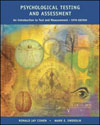 |
1 |  | 
Discuss the differences and similarities between the terms brain damage, neurological damage, and organicity. |
|  | |
 |
 |
2 |  | 
Discuss the evidence for the non-unitary nature of "organicity." |
|  | |
 |
 |
3 |  | 
How do the neurologist and neuropsychologist work together and complement each other? Differentiate their responsibilities. |
|  | |
 |
 |
4 |  | 
Why is it essential for a neuropsychological evaluation to include a history taking, a mental status examination, and the administration of a neuropsychological test battery? Why is it a good practice for diagnostic decisions not to be based on the results of one measure? |
|  | |
 |
 |
5 |  | 
Distinguish between organic and functional disorders. Why is this distinction important? |
|  | |
 |
 |
6 |  | 
List and discuss some of the physical examination procedures that neuropsychologists can perform (noninvasive), and what area of functioning each measure is designed to tap. |
|  | |
 |
 |
7 |  | 
What are the advantages and limitations of both "flexible batteries" and "prepackaged batteries" or "fixed" in neuropsychological assessment? Discuss the implications of the Chapple case (see chapter Close-up) with regard to admissibility of evidence in court yielded from "flexible" versus "fixed." |
|  | |
 |
 |
8 |  | 
What are the common types of validity evidence presented for neuropsychological test batteries? |
|  | |
 |
 |
9 |  | 
Why are memory, cognitive functioning, verbal functioning, perceptual, motor, and perceptual-motor tests included in a chapter on neuropsychological assessment? |
|  | |
 |
 |
10 |  | 
Why is the Bender more popular among non-neuropsychologists than with neuropsychologists? Based upon the psychometric data presented in the chapter, what conclusions can be made about the Bender as a neurological diagnostic instrument? What about its use for assessing personality? |
|  | |
 |
 |
11 |  | 
Discuss how case histories and case studies are used in neuropsychological assessment. |
|  | |
 |
 |
12 |  | 
Discuss the use of tests of memory in neuropsychological assessment. Take the various subtests of a neuropsychological assessment tool such as the Wechsler Memory Scale-III and discuss how they assess components of memory outlined in the model presented in the chapter. |
|  | |
 |



 2002 McGraw-Hill Higher Education
2002 McGraw-Hill Higher Education